Part-time Optimist
Featuring: Logan Robins
This issue marks the two-year anniversary of Twig & Ink! Thank you for reading, liking, sharing, commenting, and just being generally supportive. I sincerely appreciate it.
As always, I have people lined up for future issues, and more in mind. I also love hearing your ideas! If you’d like to recommend a person (or organization) who is working at the intersection of science, art, and writing, please be in touch.
This month I’m delighted to welcome Logan Robins to Twig & Ink. Logan’s blend of humor, self-reflection, and creativity as an approach to connect people with the natural world and confront big questions and problems is just what I need right now. I hope this interview brings a bit of thought-provoking levity to your day, too!
Interview: Logan Robins
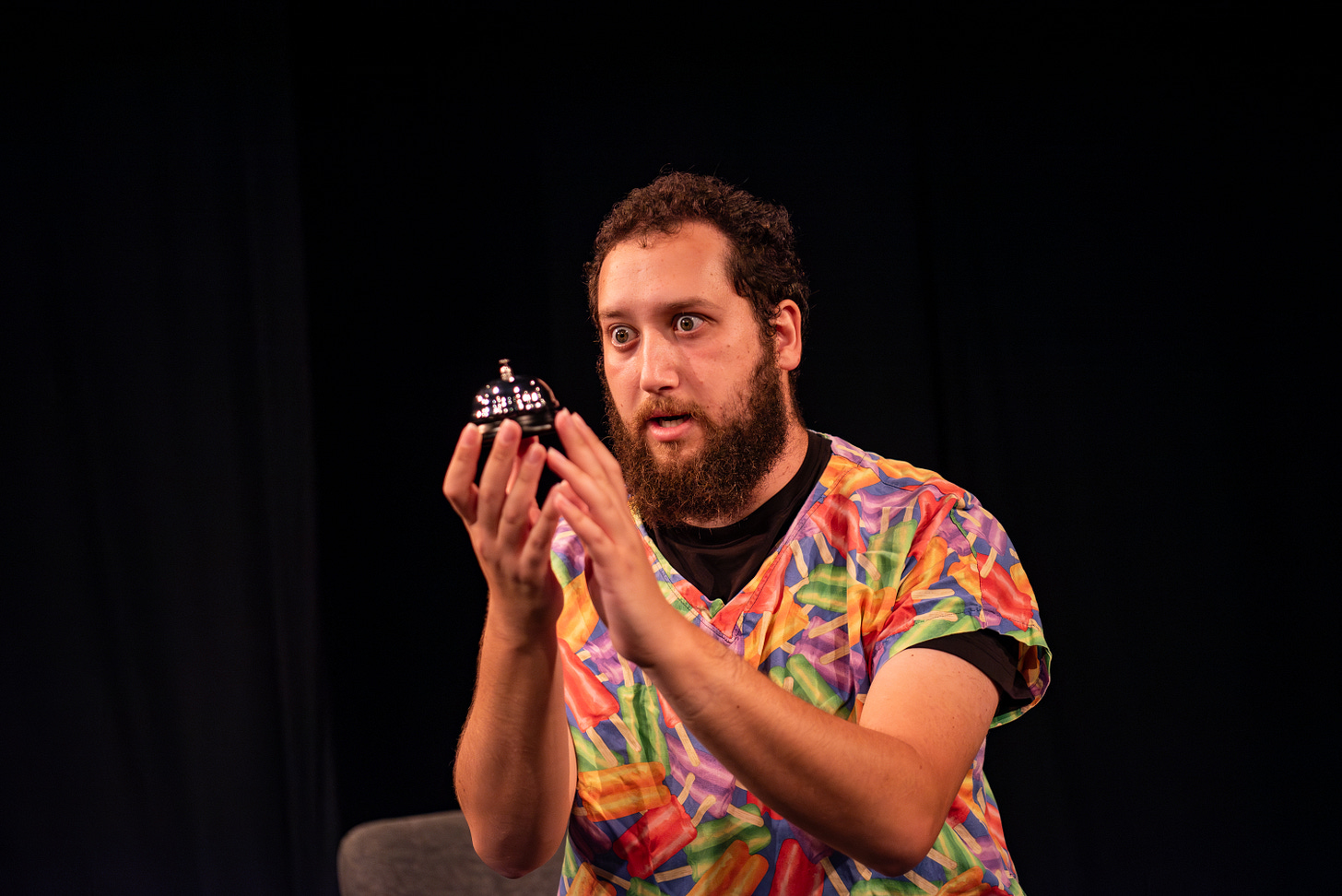
Welcome, Logan! What sort of work do you do?
I am an environmental theatre maker, director, puppeteer, performer, musician, writer, educator, sound designer, and creator of exhaustive lists. I am a freelance artist and jack of odd trades. I am the artistic director of my own theatre collective—The Unnatural Disaster Theatre Co. I have been many many things which have branched off into me becoming even more and more things. I think I like it that way!
The work that I do is multifaceted. On any given day I may be holed up in my cozy little plant-filled office hunched over my laptop writing emails or dressed in a full goose costume honking at passersby and wreaking havoc (funny enough, the latter is what pays the bills).
I am an educator and an entertainer and someone who does their best everyday to fuse the two together into their dream career.
I create immersive experiences (often theatrical in nature) with an aim to connect my community with the natural world. Living on a planet that is on a dangerous ecological runaway train has shaped me into an artist who investigates the beauty and disasters that exist in these unnatural times.
I am an optimist (part time, anyways).
What aspect of your work are you excited about?
I always feel the most excited about work that allows me to connect my passion for theatre and science. It is important to me that I make the most of any opportunity I have to tell stories about the species and ecosystems that matter to me. Writing musicals about invasive hippos? The dream. Building macabre puppets out of natural materials (bones, moss, wood)? Thrilling! A sci-comm clown show? Perfect.
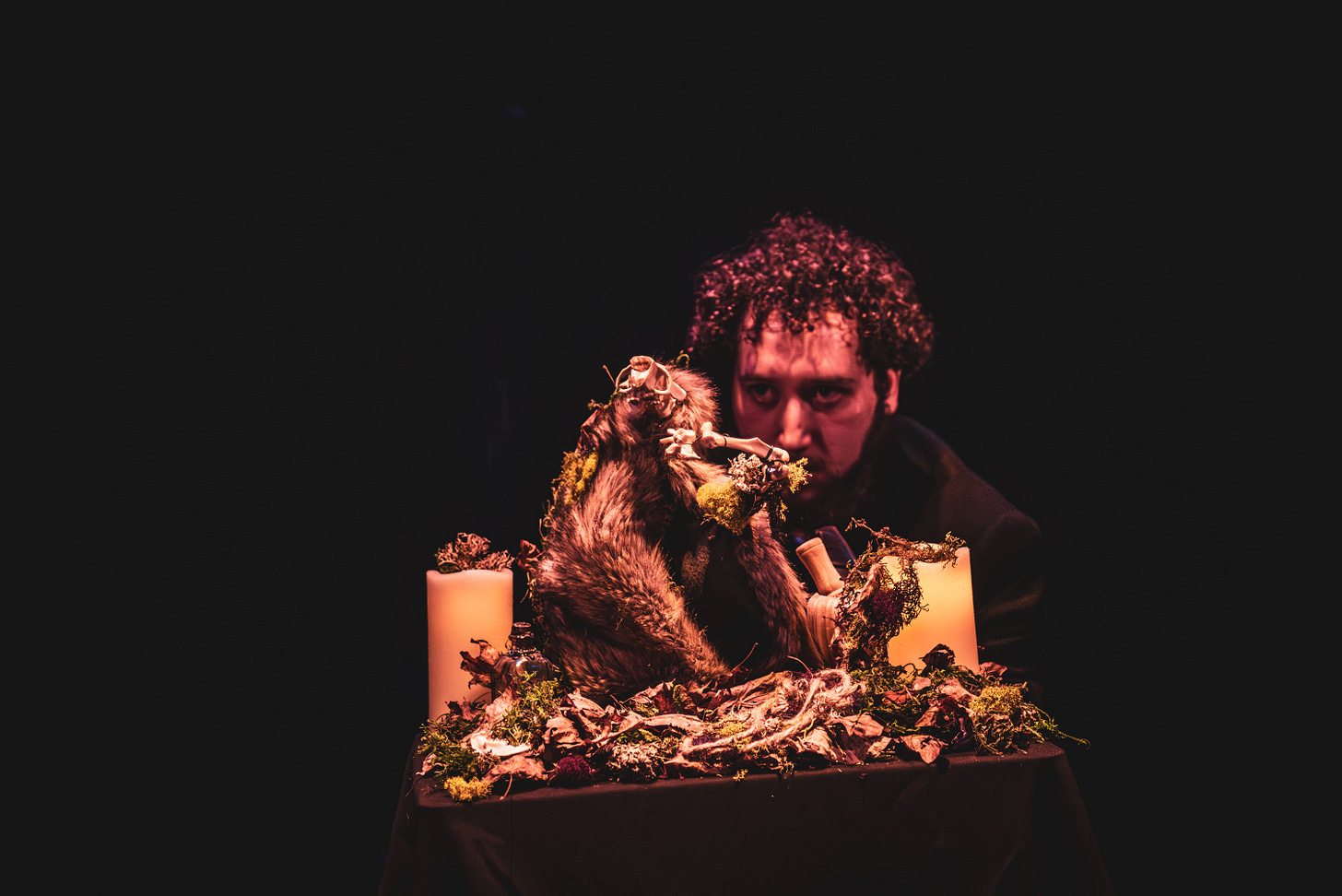
The work that is strange, surprising, and culturally significant excites me the most.
In terms of types of projects that have the most meaning to me…
I have a very soft spot for site-specific performance. There is magic to telling stories outside, where the audience can feel the air and hear the frogs. It sometimes feels impossible indoors to create a connection between an audience and the subject matter as it pertains to our relationship with the natural world. When it happens outdoors the veil is lifted and this is when I feel my work has the most meaning to me (and others).
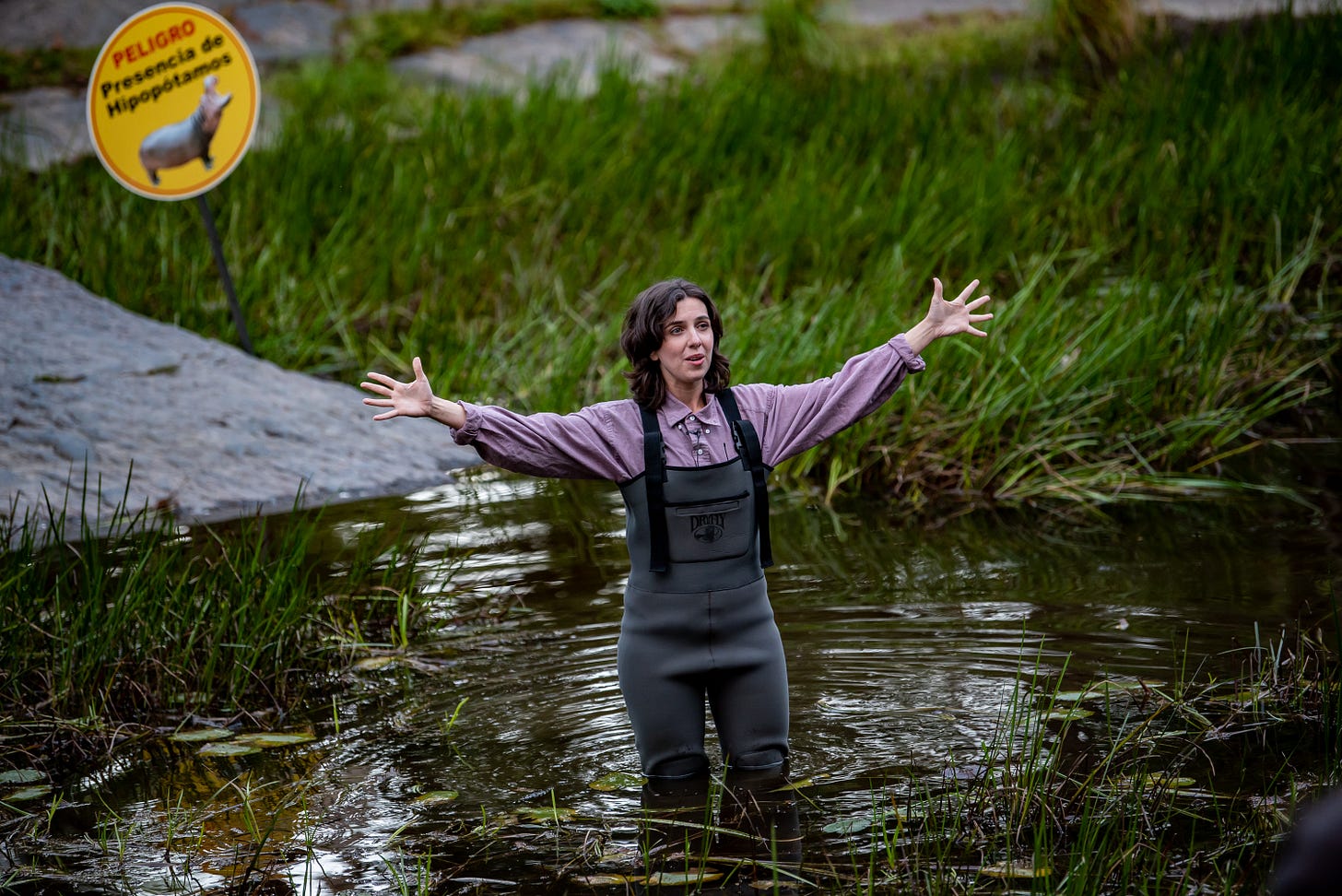
How are science, art, and writing part of your work, and how is the interaction between these areas important to you?
Before becoming a full time artist I was quite sure that I wanted to be a scientist. More specifically—I wanted to be Steve Irwin. Bill Nye. The Kratts. I wanted to study and learn everything I could about wildlife and find ways to communicate it that engaged with folks. I wanted to be in the field. Hands on. Taking audiences with me as I shared the wonder of the flora and fauna on our planet.
I spent several years as a zookeeper, wildlife rehabilitator, and traveled nationally presenting biodiversity education to thousands of Canadians.
Needless to say, my trajectory down the scientist-to-TV personality pipeline fizzled out after a couple of years of university (with a special shout-out to Calculus and Chemistry for sinking me). I started school in the Marine Biology department and ended with an Honors BA in Acting. I did go on to write a musical about hagfish, crabs, and sharks though, so it was sort of a ‘mission failed successfully’.
I discovered that telling stories about the issues I cared about could be my way to reach people. To make change.
Science and art can come together so exquisitely to forge something greater than the sum of their parts.
Is there a particular environmental problem that feels important to you? What do you do about that?
An environmental problem that feels important to me is habitat loss. In my creative work I have explored habitat loss from rain forests to coastal islands to the bottom of the Atlantic. The destruction and encroachment on habitat is an issue that I feel fosters a lot of disconnect between people and their ecosystem(s).
I feel like exploring and sharing artistic expressions has been my small way of trying to engage more people with our connection to the land we are on (both under our feet and the planet as a whole).
In my play Hippoposthumous, I explore the invasive hippo population in Colombia through the lens of North American colonisation. Telling stories from the perspective of animals has allowed me not only the freedom to give voice to the creatures who can not speak to us on our terms, but to also create compelling characters that anyone can identify with.
I use this device as a writer to bring awareness and a different perspective to environmental problems such as habitat loss.
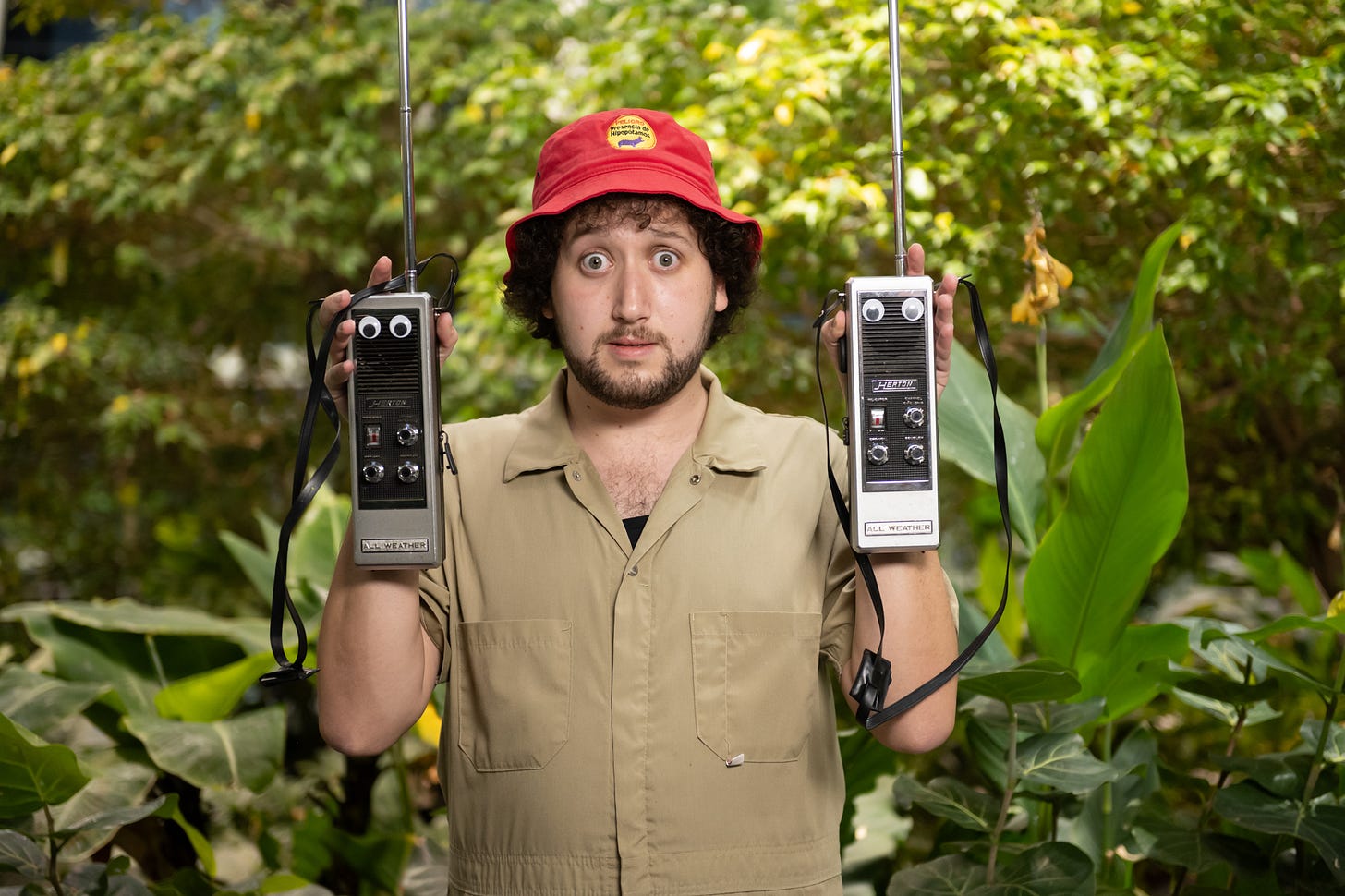
How does your identity and perspective affect your work?
My background in animal husbandry and wildlife education has impacted my work enormously. It instilled in me an irrevocable empathy for all living things which (I like to believe) comes through in my work.
My identity as a white settler living and creating in the Moolipchugechk region of Mi’kma’ki (colonially known as Herring Cove, Nova Scotia) also certainly affects my work. I am a Jewish person. I am a queer person. I am a first generation Canadian on my father’s side and fourth on my mom’s. My family, to the best of my knowledge, comes from England, Poland, and Russia.
All of these aspects of my personality meet at the confluence of who I am as an artist and an individual.
All of these affect my work by making me curious, open minded, and aware of my own privilege—which I do my best to utilize to serve those in my community.
I grew up in a not very outdoorsy family. This has meant I have had the joy of discovering my passion for nature later in life! This directly ties to my passion for site-specific storytelling!
What influences and inspires you?
I am really inspired by the artists around the world who dedicate their creativity to making a positive impact. Especially puppeteers! It takes an enormous amount of care, time, and sheer will to bring an object to life and when it happens…wow!
I love the work of Papermoon Puppet Theatre in Indonesia, Snuff Puppets in Australia, and The Old Trout Puppet Workshop in Alberta, Canada (to name a few).
In my creation I am undoubtedly influenced by the renaissance of Disney animated films. The music and storytelling prowess of Alan Menken & Howard Ashman blow me away and are something I aspire to when writing musicals. I also really love Dave Malloy (Great Comet, Ghost Quartet, Octet). Malloy inspires me as a writer because he uses words in ways that have changed my life (no exaggeration—go listen to Octet).
I am inspired by my partner, Jessie, and every other person who dedicates their life to the arts against all odds because they believe in the power of what they’re creating.
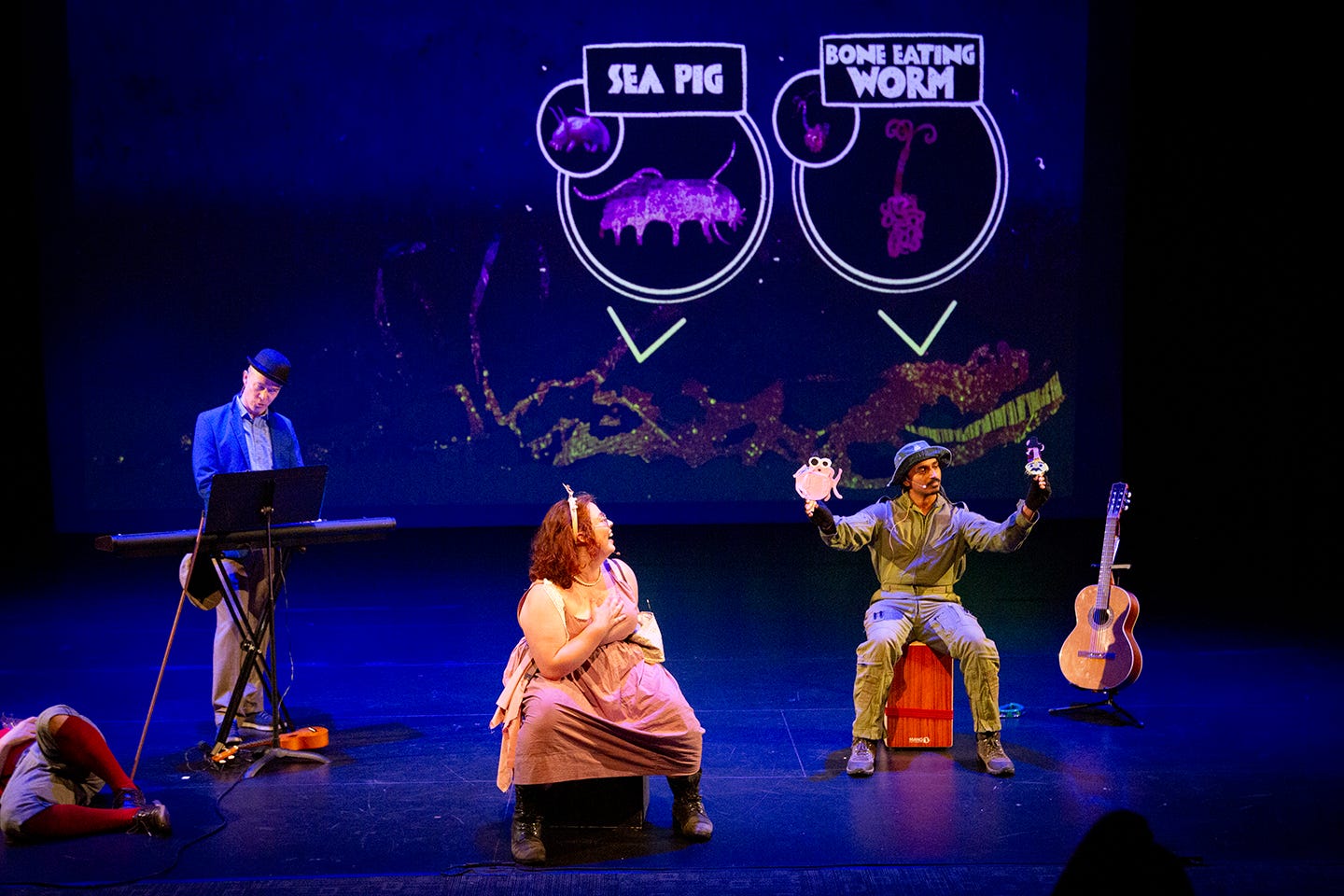
What's your favorite method or technique to learn something new? (from Kate Rutter, 013)
I love learning by doing. One of my favourite things to do in a new city is to go to the highest point I can, look out over the city, find a landmark, and then try to navigate my way there (sans GPS). I think getting myself intentionally lost makes me more open to learning new things.
If you could have a day to hang out with anyone in history and geek out together, who would you choose, why, and what would you do together? (From Yvea Moore, 004)
I would love to go on a hike with Charles Darwin. I’d love to pick his brain and nerd out about evolution and worms.
What sort of mental or social barriers have you encountered when advocating for the relationship between art and science? How did you overcome them? (From Derek Russell, 002)
The biggest barrier I have encountered is the politicisation of everything. This is no doubt an issue on a grander scale, but I notice that it especially rears its ugly head when I am advocating for art to teach something. Especially theatre for young people.
Are you interested in collaborating with other groups or individuals on science-art-writing projects? If so, what sorts of collaboration are you interested in, and what are you most excited to share?
Yes! Always! I believe that collaborative creation is the greatest way to create. I am incredibly interested in collaborating with scientists, artists, and those who are oddly in between like me. I love to use my background and knowledge of producing to help make projects happen logistically. I am also always keen to use my niche skills (like puppetry) to assist in bringing stories to life!
Anything else you’d like to tell us?
Life on this planet can be overwhelming. Especially lately. It won’t work for everyone, but I like to look up at the stars and remind myself that I am on the same sphere as every elephant, tree, and person. Then I try to breathe. I learned a lot about breath work in school (one of the many things I am grateful to my arts education for). I love living a life of contradictions and being whatever I want to be and creating whatever I dream, and I wish that for every other person! Go make something! Be weird! I know this question wasn’t to ‘give life advice’ but alas, here I am.
Thank you so much, Logan!
You can learn more about Logan here, and The Unnatural Disaster Theatre Co. here and also here!


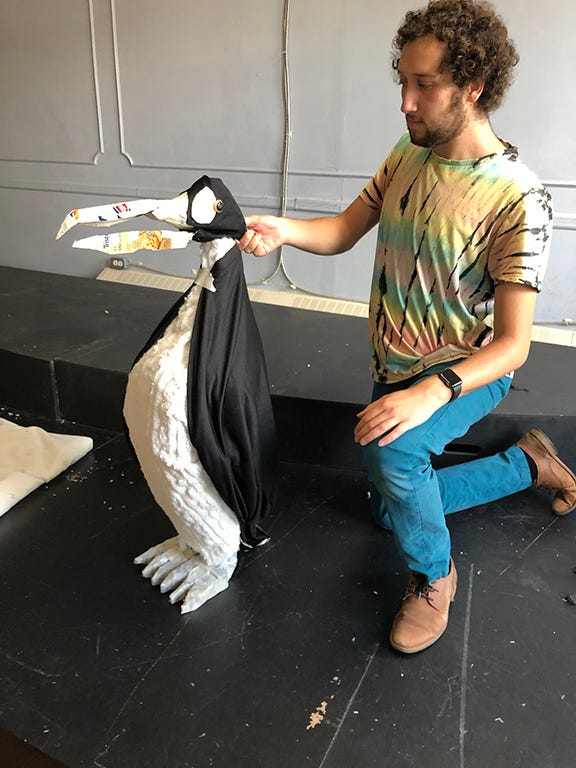
Hippoposthumous! What a great title. I love a good portmanteau. And this interview was a delight to read.
Logan Robins is an inspiration. Thank you LKS.